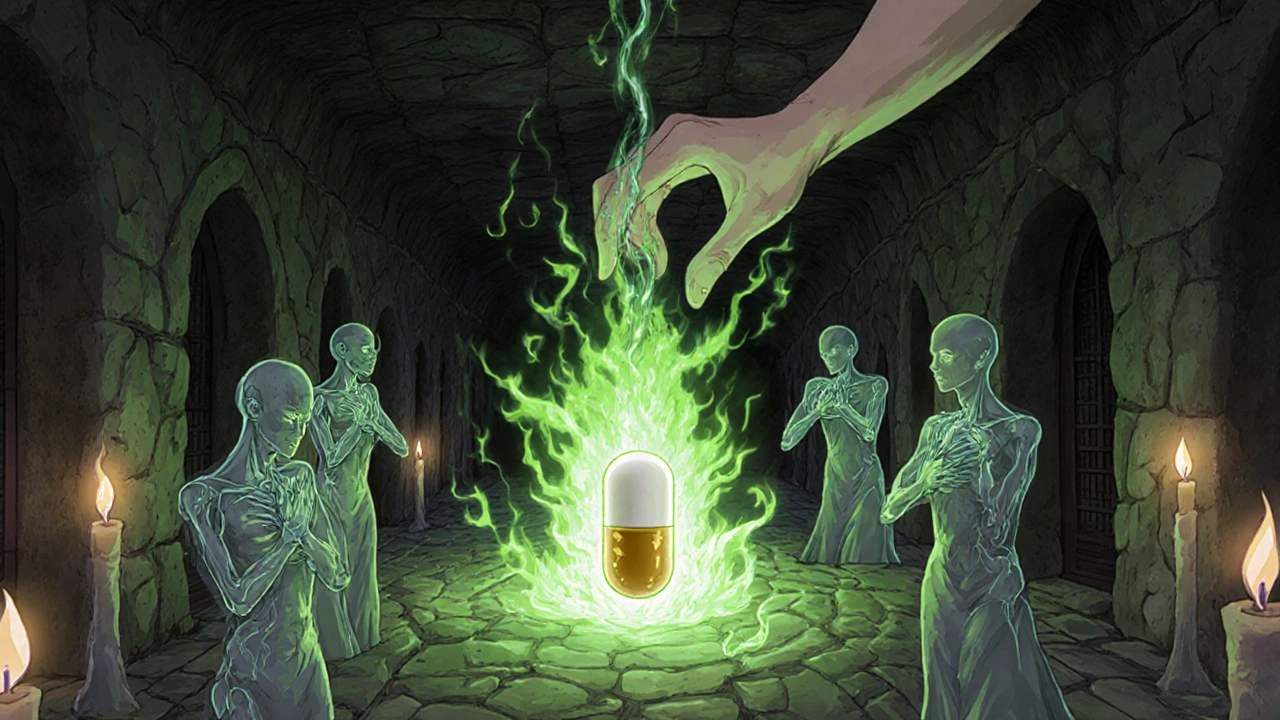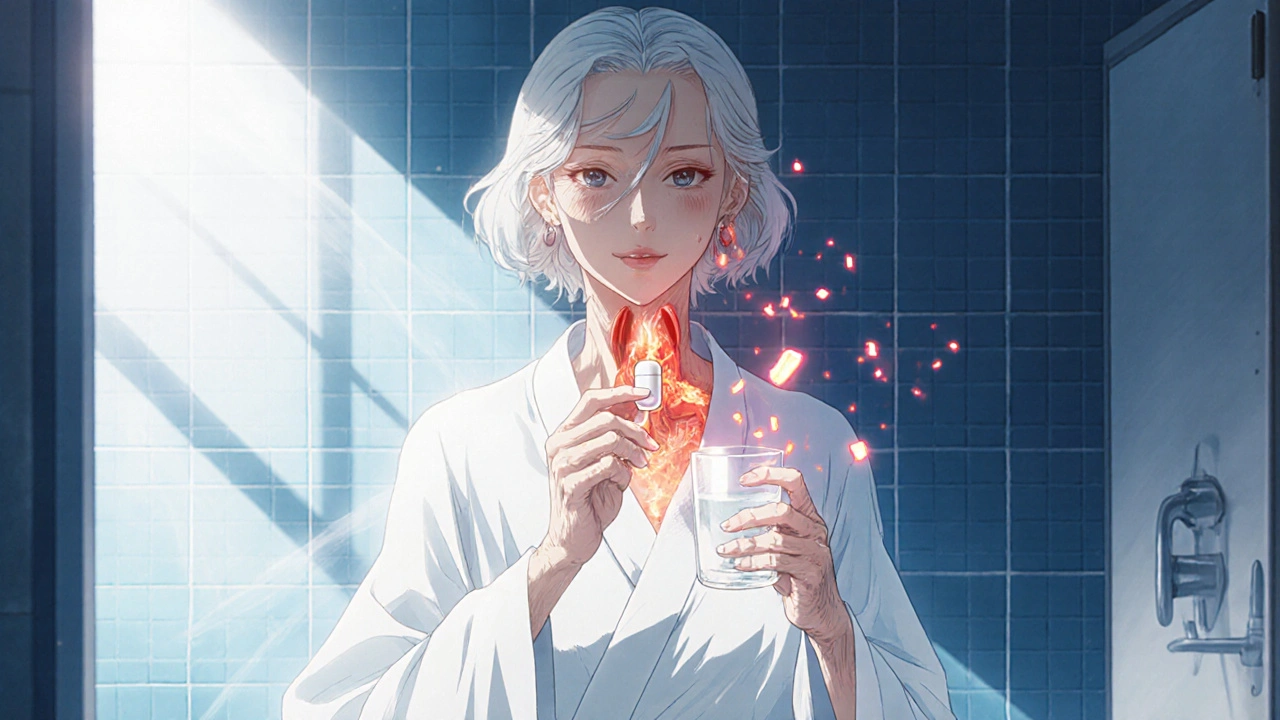Bisphosphonate Safety Checker
Check Your Medication Safety
Ensure your bisphosphonate routine meets FDA guidelines to prevent esophageal irritation.
Results will appear here...
When you’re taking a pill to protect your bones, the last thing you want is for it to damage your esophagus. But for people with GERD, common osteoporosis medications like alendronate (Fosamax), risedronate (Actonel), and ibandronate (Boniva) can turn a simple daily routine into a risk for serious irritation, ulcers, or even bleeding. This isn’t theoretical - the FDA has issued safety warnings about it since 2011, and real patients have ended up in the hospital because they didn’t know how to take these drugs safely.
Why Bisphosphonates Can Hurt Your Esophagus
Bisphosphonates work by slowing down bone loss. They’re effective - reducing fracture risk by up to 70% in people with osteoporosis. But they’re also harsh chemicals. When you swallow them, they don’t just disappear into your stomach. If they get stuck in your esophagus - the tube connecting your throat to your stomach - they can sit there and burn the lining. The problem gets worse if you have GERD. That’s because GERD means your stomach acid is already backing up into your esophagus. When bisphosphonates like alendronate hit a low-pH environment (below 2.0), they change form. They turn from a salt into a free acid - and that acid is strong enough to cause chemical burns. Studies show this happens in about 0.7% of users, but for someone with existing reflux, the risk jumps significantly. What does this look like in real life? People report chest pain that feels like heartburn, trouble swallowing, or a burning sensation behind the breastbone. In one documented case, a 72-year-old woman developed severe esophagitis after taking her alendronate pill and lying back down to watch TV. She needed endoscopy and hospital treatment. That’s not rare - FDA reports show over 170 distinct esophageal side effects tied to these drugs since 2004.How GERD Makes Things Worse
GERD isn’t just a background condition here - it’s a trigger. About 20-30% of U.S. adults have GERD. If you’re one of them and you’re prescribed an oral bisphosphonate, your risk of esophageal injury is nearly five times higher than someone without reflux. Why? Two reasons:- Your esophagus is already inflamed from acid exposure, so it’s more sensitive to chemicals.
- GERD often comes with poor esophageal motility - meaning the muscles don’t push the pill down fast enough. The pill lingers, and the damage starts.
The Right Way to Take Bisphosphonates (And Why It Matters)
This isn’t about being careful. This is about following exact rules - because skipping even one step can turn a safe drug into a dangerous one. Here’s what the FDA and gastroenterology guidelines say you must do:- Take the pill first thing in the morning, on an empty stomach.
- Swallow it with a full 8-ounce glass of plain water. Don’t use mineral water, juice, coffee, or tea. Those can bind to the drug and keep it from dissolving properly.
- Stay fully upright - sitting or standing - for at least 60 minutes after taking it. No lying down. No leaning back. No napping.
- Don’t eat or drink anything else during that hour. Not even water.
- Wait at least 30 minutes after taking the pill before eating breakfast.

What If You Already Have GERD?
If you’ve been diagnosed with GERD, your doctor should screen you before prescribing an oral bisphosphonate. If you’ve had symptoms for years - heartburn, regurgitation, hoarseness - you’re at higher risk. In those cases, alternatives exist. Denosumab (Prolia) is a monthly injection that works just as well to prevent fractures but doesn’t touch your esophagus at all. No irritation. No burning. No risk of ulcers. The downside? It costs over $1,500 per dose. Insurance often covers it, but prior authorization can be a hassle. Zoledronic acid (Reclast) is an annual IV infusion. It bypasses the digestive system entirely. It’s effective, convenient, and avoids esophageal damage. But it can cause flu-like symptoms the first few days, and people with kidney problems need to be monitored. Teriparatide (Forteo) and romosozumab (Evenity) are other options. Teriparatide is a daily injection that actually builds new bone. Romosozumab is a monthly shot that does both - builds bone and slows breakdown. But both are expensive, and romosozumab carries a heart risk warning. For most people, the cost difference is the deciding factor. Generic alendronate costs less than $1 per pill. Denosumab is 150 times more expensive. So if you can take your bisphosphonate safely, it’s still the best choice.Signs You’re Having a Reaction
If you start taking a bisphosphonate and notice any of these within hours or days, stop the pill and call your doctor:- New or worsening chest pain that doesn’t go away with antacids
- Difficulty swallowing - food feels stuck
- Pain when swallowing
- Heartburn that lasts longer than a few days
- Vomiting blood or black, tarry stools

What to Do If You Can’t Tolerate Oral Bisphosphonates
If you’ve tried taking the pill correctly - with water, upright, no food - and you still get heartburn or pain, talk to your doctor. Don’t just quit. There are options.- Switch to an IV bisphosphonate like zoledronic acid (Reclast).
- Switch to denosumab (Prolia) if cost isn’t a barrier.
- Ask about a bone density scan to confirm you really need the drug. Some people are prescribed bisphosphonates too early.
- Consider a proton pump inhibitor (PPI) like omeprazole - but only if your doctor recommends it. PPIs reduce acid, but they don’t fix the physical irritation from the pill.
Bottom Line: You Can Take Bisphosphonates Safely - If You Know How
Bisphosphonates save lives. They prevent broken hips and spines in older adults. But they’re not harmless. For people with GERD, the risk is real. The good news? You can avoid almost all complications by following the rules. Take them with plain water. Stay upright. Wait an hour. Don’t eat. That’s it. That’s the whole protocol. No magic. No supplements. Just discipline. If you can’t do that - if you’re tired of sitting upright for an hour, or your GERD is too severe - talk to your doctor about alternatives. There’s no shame in choosing a safer option. Your bones matter. But so does your esophagus.And if you’ve been taking these pills for years without knowing the rules? It’s not too late. Start now. Your body will thank you.


krishna raut
October 30, 2025 AT 23:42Take bisphosphonates with plain water, stay upright for 60 min, no food. That’s it. No magic. Skip one step? You’re asking for trouble. Seen it in clinic-patients think they’re fine if they sit up for 20 minutes. Nope.
Nate Girard
November 1, 2025 AT 05:03I took Fosamax for two years and never knew about the 60-minute rule. I’d just take it before breakfast and lie back down to scroll my phone. Ended up with this weird chest tightness that felt like acid but didn’t respond to Tums. Switched to Prolia and it’s been life-changing-no more dread every morning. Why isn’t this drilled into every prescription?
Emily Kidd
November 2, 2025 AT 07:23omg yes i had the same thing!! i thought it was just my acid reflux getting worse but nooo it was the pill just chillin in my esophagus like it owned the place. switched to Reclast and now i just get a little achey for a day once a year. worth it. also, plain water only. dont even try sparkling. trust me.
Prakash pawar
November 3, 2025 AT 22:35the real tragedy here is how we’ve turned medicine into a ritual of obedience while ignoring the root cause. why are we forcing old people to swallow chemical knives just to delay bone decay? the body isn’t broken-it’s neglected. poor diet, no sun, no movement. we treat symptoms like criminals instead of listening to the system. bisphosphonates? they’re just bandages on a hemorrhage. but hey at least you can take them upright
Alex Hundert
November 4, 2025 AT 21:18Prakash, you’re missing the point. People with osteoporosis are at risk of breaking a hip and dying within a year. That’s not ‘neglect’-that’s biology. Bisphosphonates cut fracture risk by 70%. Yes, they’re harsh. But they’re also the only thing standing between a 75-year-old and a wheelchair. If you want to fix the root cause, go start a community garden. But don’t tell someone who just got diagnosed to skip the drug that keeps them alive.
Carolyn Kiger
November 6, 2025 AT 02:59I’m a nurse and I’ve seen this too many times. Elderly patients take their pills with coffee because ‘it’s easier’. Or they lie down because they’re tired. Then they come in with esophagitis and wonder why. We need better education-not just on the pill, but on how to live with these conditions. Maybe a simple video in the pharmacy? Or a text reminder? This isn’t rocket science, but it’s life-changing if done right.
caiden gilbert
November 6, 2025 AT 21:52the way bisphosphonates just… sit there like a silent assassin in your esophagus? it’s like your body’s got a tiny, angry ghost living in your throat, whispering ‘you shouldn’t have done that’ every time you swallow. i used to think it was just ‘bad luck’ until i learned how the damn things turn acidic when they get stuck. now i take mine like a monk in a monastery-no food, no lying, no distractions. just water. just stillness. just survival.
Justin Cheah
November 6, 2025 AT 22:31you ever wonder why the FDA only updated the 60-minute rule in 2023? because the drug companies didn’t want to admit their $1 pills could be killing people. they knew. they had the data since 2011. but why scare off customers when you can just slap on a tiny warning in the 8pt font no one reads? and don’t get me started on denosumab-$1500 a shot? that’s not medicine, that’s a luxury tax on aging. they want you addicted to injections so you can’t switch back. it’s a profit pipeline disguised as healthcare
MOLLY SURNO
November 7, 2025 AT 11:21Thank you for this detailed and thoughtful post. I appreciate the clarity on the distinction between GERD-related damage and bisphosphonate-induced injury. As someone who has managed both conditions, I can confirm that the isolated ulceration pattern is easily mistaken for typical reflux. The emphasis on upright posture and plain water is critical. I’ve shared this with my mother, who is now on Reclast-she says she feels safer knowing the protocol was followed correctly. Small changes, real impact.